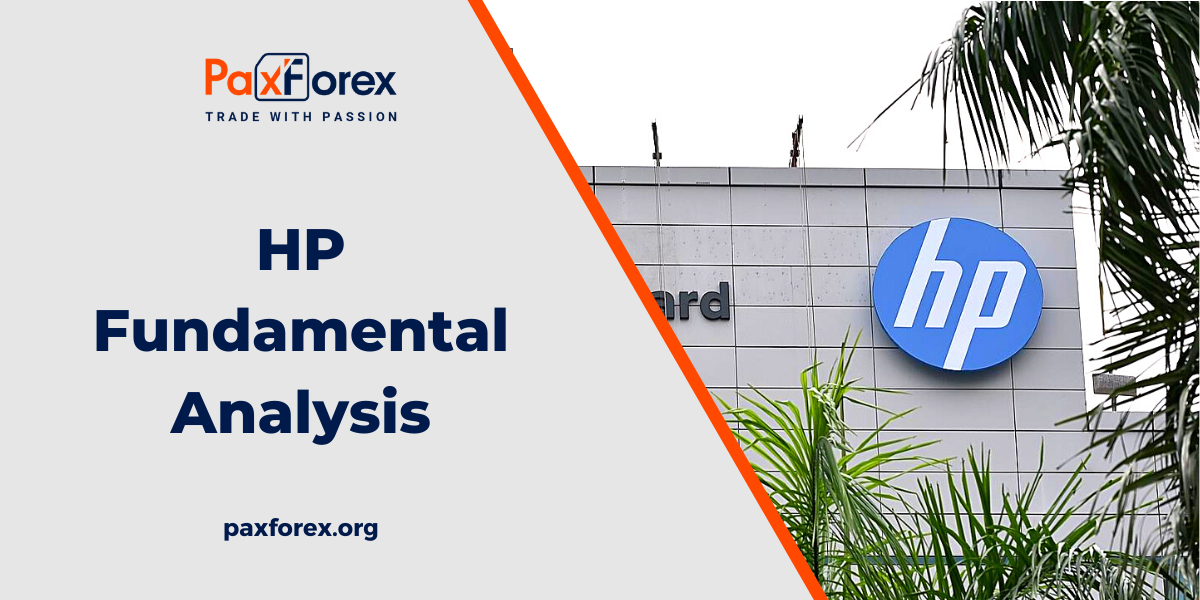
Source: PaxForex Premium Analytics Portal, Fundamental Insight
Shares of electronic company HP -- not to be confused with cloud company HP Enterprises -- appeared in Warren Buffett's stock portfolio this spring. In a regulatory filing, Berkshire Hathaway said it acquired more than 11 percent of HP stock, which is valued at nearly $3.8 billion.
However, the consumer electronics industry has been in trouble lately, and shares of the slow and steady HP are down about 15% this year. Where will HP be in a few years? And should you follow Buffett's lead and buy the stock? Let's break it down.
HP is a leading home and business electronics manufacturer. The company reflects its sales in two segments: personal systems (PCs, laptops, accessories) and printing (printers, inks, and even some really high-end 3D printers). Ever since HP separated from its cloud division HP Enterprises in 2015, HP has been betting modestly on technology devices.
In the past two years, the pandemic has caused a flurry of sales of work-at-home computers. Now, however, that increased spending seems to be winding down. Chip maker Micron Technology indicated in its latest quarterly report in late June that there is a glut of consumer tech devices in the market, and it may take several quarters to deal with it. In other words, HP's sales are likely to pick up speed this year, which was the reason for the company's recent share price decline.
Not that HP has been rushing down the road at great speed from the start. PCs and printers are not the fastest-growing segments of the technology industry. It's a cyclical market that generally follows consumer and business spending trends -- which tend to move up and right gradually in small increments over time. This situation is unlikely to change in five years. HP's technology lineup will evolve, but more so at the expense of its technology partners (e.g., semiconductor companies such as Nvidia and software companies such as Microsoft) than at the expense of HP.
So why did Buffett add HP to Berkshire's portfolio? Stability, slow and steady growth, and return of capital to shareholders. HP has generated $5.32 billion in free cash flow over the past 12 months (free cash flow margin is only 8%), but it has returned almost all of that amount to shareholders in dividends and share repurchases.
In the fiscal year 2021 (the year ended Oct. 31, 2021), share repurchases totaled $6.25 billion and dividends paid totaled $938 million. For the first six months of the fiscal year 2022 (the six months ended April 2022), share repurchases totaled $2.52 billion, and dividends paid totaled $533 million. The stock currently trades at a paltry 6.8 times the 12-month free cash flow, and the dividend yields 3.1% a year.
Given that HP has plenty of competitors in the personal computer and office equipment market, there's little reason to believe that the stock will suddenly rush upward. On the contrary, the company knows what it is and is not invested in trying to make any radical changes. At this point, it's all about the return on capital. In a few years, HP's business will look about the same as it does now.
Should you buy HP stock? If you like cheap assets and income-producing investments, then by all means take a closer look at this company. If not, simply owning a share of Berkshire Hathaway stock will give you everything you need or want from HP over the next few years.
As long as the price is below 33.50, follow the recommendations below:
- Time frame: D1
- Recommendation: short position
- Entry point: 31.94
- Take Profit 1: 30.50
- Take Profit 2: 29.50
Alternative scenario:
If the level of 33.50 is broken-out, follow the recommendations below:
- Time frame: D1
- Recommendation: long position
- Entry point: 33.50
- Take Profit 1: 34.50
- Take Profit 2: 35.50













